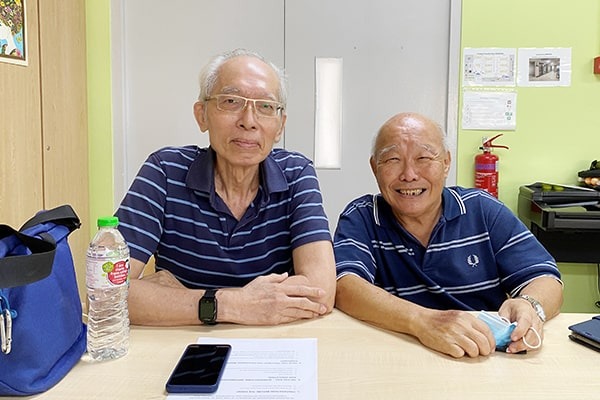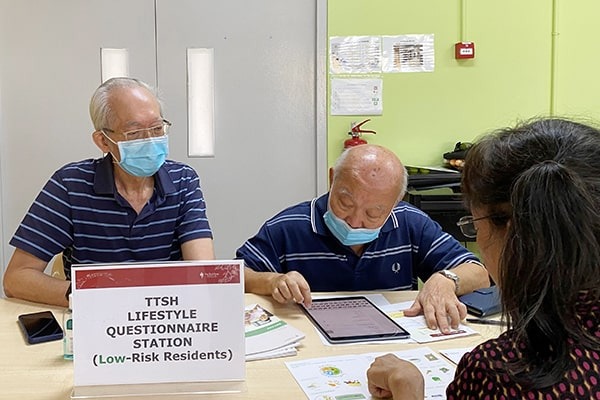By CareElderly@Golden Ginger and Tan Tock Seng Hospital
 Mr Peh Wee Beng (left) and Mr Stanley Peh (right) volunteering at CareElderly@Golden Ginger during a screening event.
Mr Peh Wee Beng (left) and Mr Stanley Peh (right) volunteering at CareElderly@Golden Ginger during a screening event.
Singapore’s ageing population is often spoken of in slightly negative terms, presenting challenges that need to be tackled. At the same time, a wealth of seniors in our community can also mean a wealth of knowledge, experience and wisdom that we can collectively tap on. Many seniors are motivated to keep themselves updated and to impart this knowledge to their peers through volunteering.
At a recent CareElderly@Golden Ginger health screening event, we sat down with Mr Stanley Peh and Mr Peh Wee Beng, two 70-year-old volunteers from Care Community Services Society’s Active Ageing Centre, to learn about their motivations to volunteer in the community.
 Stanley: I have been volunteering for more than 10 years now. My first volunteering encounter was with Tsao Foundation; I saw an advertisement in the newspapers. My role was to be a befriender to residents who were living alone. We conducted one-on-one home visits to understand their needs and chit-chat with them.
Stanley: I have been volunteering for more than 10 years now. My first volunteering encounter was with Tsao Foundation; I saw an advertisement in the newspapers. My role was to be a befriender to residents who were living alone. We conducted one-on-one home visits to understand their needs and chit-chat with them.
After that, someone recommended me to volunteer with Health Promotion Board (HPB), which I do more frequently because they have many programmes and roadshows like the recent Healthier SG roadshows. For example, during National Steps Challenge roadshows, we would share with residents how to use the steps tracker, how to clock H365 points, and more. I have a lot of interest in health-related programmes in general, including healthy eating habits, identifying food with good nutrition, etc.
Wee Beng: I started volunteering in October 2022. One of the volunteer activities is joining our church group for weekly visits to Kwong Wai Shiu Hospital (KWSH) to lead residents in worship and just spend time with them. The group has been doing this for 40 to 50 years.
 Stanley: We have young children and elderly parents to look after. There will be a financial burden upon the onset of any illness, so I try to do what I can to prevent falling ill. There is plenty to learn from such health promoting programmes, like tips on nutrition or how to reduce intake of salt and sugar. Recently, they distributed low sodium salt to all the volunteers at a HPB roadshow. It was my first time seeing something like this!
Stanley: We have young children and elderly parents to look after. There will be a financial burden upon the onset of any illness, so I try to do what I can to prevent falling ill. There is plenty to learn from such health promoting programmes, like tips on nutrition or how to reduce intake of salt and sugar. Recently, they distributed low sodium salt to all the volunteers at a HPB roadshow. It was my first time seeing something like this!
After my mum fell ill, I realised that health awareness starts young. In the past, it was common for us to deep fry pork lard and consume them as snacks. That is why we see so many of the elderly falling ill and suffer from chronic illnesses. The “three highs” have become very common for my generation of seniors because of the unhealthy food we have consumed since young. We can’t just eat everything we want to. The onset of diseases does not happen overnight, it is accumulated over time depending on our lifestyle and habits. With this, I have become more mindful of my lifestyle.
Wee Beng: There are a few factors that encourage us to sign up for health programmes. Topic of interest and where and how the programme is conducted.
Stanley: I recommended Wee Beng to the programme after seeing a recruitment poster at Tan Tock Seng Hospital (TTSH) during a doctor visit. I used to work as a tour guide so my time is much more flexible to attend such programmes. We went for several modules, including one on Zoom.
There is a module, Creating a Safe Home Environment to Reduce Risks of Falls and Proper Handling of a Wheelchair that taught us how to manage and use a wheelchair, as well as some safety precautions make my home a safer place.
Wee Beng: Most of the patients at KWSH are on wheelchairs, so the wheelchair module is highly relevant to us. After learning, we pass on this knowledge to other people who are volunteering alongside us.
Knowing how to handle the wheelchair properly is a skill. It is not as simple as what people think. You cannot just push the person on the wheelchair without knowing how to handle it safely. You must be aware of how the equipment should be used and the safety protocols behind it. Good habits such as locking the wheelchair when there is no one attending to the person on the wheelchair are often overlooked, so it’s important to emphasise.
 Mr Peh Wee Beng (left) and Mr Stanley Peh (right) administering the Lifestyle Questionnaire at a community screening event.
Mr Peh Wee Beng (left) and Mr Stanley Peh (right) administering the Lifestyle Questionnaire at a community screening event.

Wee Beng: Initially, I was very worried. We were told that we had to administer the Lifestyle Questionnaire, and in English! The language is already a huge challenge because we are not fluent. It wouldn’t be so bad if it was in Chinese or just asking a few questions, but we were asked to key it into the system in English. There were many challenges. But now that I have done it, no problem already!
Stanley: I learned a lot from this session. I am quite impressed with the scale of today’s event. Usually when I come by the centre, I notice one or two TTSH nurses helping residents to take their temperature, blood pressure, height and weight, so I thought it would be similar. Little did I know, so many care providers came by today!
Wee Beng: If it fits my schedule, I would be happy to volunteer for this again.
Stanley: I have tried encouraging many friends to volunteer, but there have been more “failures” than “successes”. I have many retired friends who prefer being at home or hanging out at the coffee shop when they have time. I am well acquainted with Wee Beng’s family and his wife kept asking me to bring him out so that he doesn’t just stay at home and be bored, so I kept trying and eventually convinced him to join me for these programmes.
 Wee Beng: I will tell them the benefits and why it is good.
Wee Beng: I will tell them the benefits and why it is good.
Stanley: I will be a role model for others – tell them that after many years of volunteering, I have learned a wealth of knowledge about how to take care of myself and the people around me. It is also a better use of time, compared to being at home. I hope this can encourage others by showing how I have benefitted.